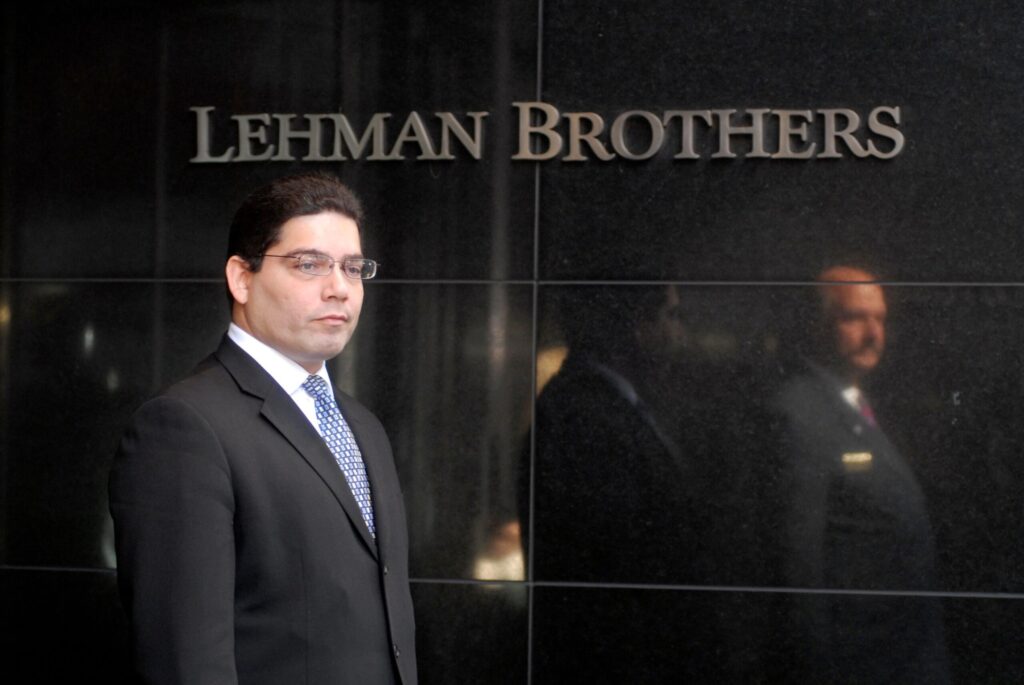On September 15, 2008 I was live on Dubai Eye radio when news came from New York of the bankruptcy of the investment bank Lehman Brothers.
I said on air that the collapse of such a blue-blood Wall Street institution was “the financial equivalent of the 9/11 attacks on the USA” – and received a lot of stick from listeners for being too sensationalist.
But I think the history of the past 17 years has proved me correct. Lehman, and the global financial crisis sparked by its demise, changed “geoeconomics” (a suddenly fashionable word) in ways just as profound as 9/11 and the decades of “war on terror” that followed.
For the UAE, it was the beginning of the long Dubai World debt crisis in 2009 which, until Abu Dhabi came to the rescue, became an existential threat to the emirate’s economic and financial progress.
Now, after three days of carnage on global equity and financial markets, I have that sinking Lehman feeling all over again.
The world, including the Arabian Gulf, is in for a wild ride which will change everything, mostly for the worse.
Let’s start from what appears to be the consensus position among all responsible economists and experts: Trump’s tariff policy is a ludicrous strategy based on a profound misreading of economic history and applied with a disregard to commercial realities.
I don’t think Americans wanted the destruction of the global economic system, nor of their pension portfolios, when a majority of them voted for him last year.
But Trump has interpreted his victory as a mandate to do whatever he likes to rectify the absurd, imaginary economic grievances he has been cultivating all these years. Like it or not, we are stuck with him.
I do not think he will backtrack significantly on the tariff policy. He will push it through, and blame the resulting chaos on retaliating Chinese and Europeans.
He will falsely claim enough “victory” to enable him to bribe US voters with big tax cuts ahead of the 2026 midterm congressional elections, even if the sums do not add up. Depressingly, a majority will fall for it – again.
But the potential for chaos in the meantime is enormous. Financial markets do not recover quickly from the kind of trauma they’ve experienced over the past few days, and the possibility for things to worsen is considerable.
Destruction of asset values leads to margin calls and liquidity problems, which the US is already seeing in private equity and hedge fund markets. Supposedly risk-free markets such as 10-year Treasury bonds and gold are whiplashing. Bitcoin and oil are suffering big losses.
This volatility in turn puts pressure on credit markets. It was a “credit crunch” morphing into a “credit crisis” in 2008 which transformed domestic US financial difficulties into a global affair.
Back then it was not such a short step from defaults in trailer parks in Kansas to cashless ATMs on Sheikh Zayed Road. Now, the feeling is that “something has to break” in US financial markets.
Dubai is much better prepared this time. There is no obvious big potential default like Dubai World – though not many saw that coming at the time – and there is a well structured and organised programme of debt repayment, some of it rolled over from the 2009 crisis, over the coming years.
James Swanston of Capital Economics estimates $77 billion of debt from the main government related corporations – or 55 percent of GDP – is due for repayment by 2030.
The interest rate volatility that is likely to follow Trump’s trade wars will do nothing to ease that programme, of course, nor will it help stabilise the Dubai real estate market.
But overall, Dubai should remain resilient in the face of Trump’s policies, bolstered by a diversified services-led economy which should see it though a decline in global trade.
It is not immediate risk to Dubai that makes me think of the Lehman days again. It is more the huge reputational hit that the USA is taking, here in Dubai and in the rest of the world, and the destabilising effect of that loss of “soft power”.
In 2008 the rest of the world learned that the much-vaunted Western financial system was not so perfect after all. In fact, it could collapse due to sheer financial incompetence – and drag the rest of the world with it.
Today, the graver threat from America is incompetence mixed with megalomania.
One silver lining from all this is that it may convince Dubai, and maybe the rest of the Arabian Gulf, to distance itself further from the USA’s economic and financial embrace.
A country which has, in less than two decades, inflicted a global financial crisis on the rest of us, and now upended 70 years of benign trade policy and brought the threat of global recession, is no longer a reliable economic partner.
Frank Kane is Editor-at-Large of AGBI and an award-winning business journalist. He acts as a consultant to the Ministry of Energy of Saudi Arabia
Register now: It’s easy and free
This content is available for registered members only. Register for your free account today for exclusive emails, special reports and event invitations.
Why sign up
Exclusive weekly email from our editor-in-chief
Personalised weekly emails for your preferred industry sectors
Read and download our insight packed white papers
Access to our mobile app
Prioritised access to live events
Already registered? Sign in



